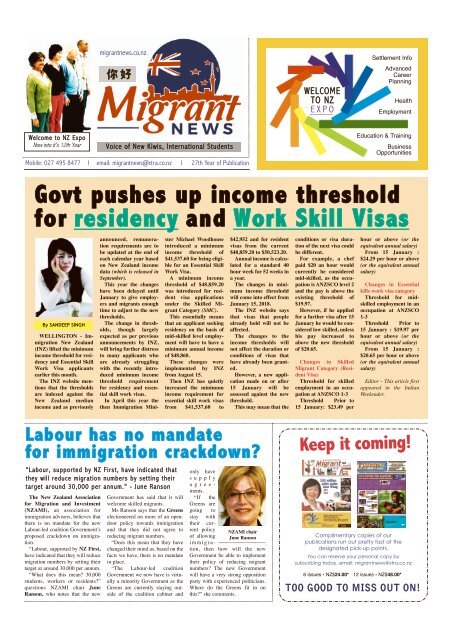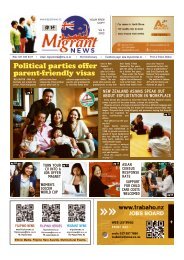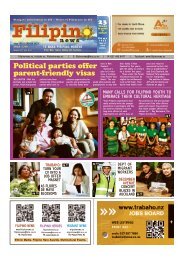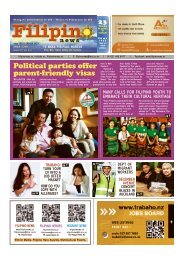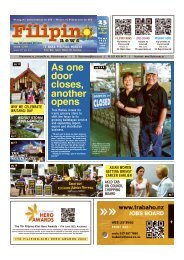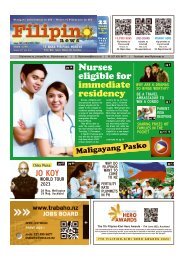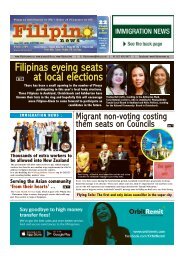Migrant News Dec 2017
www.migrantnews.nz New Zealand's only newspaper for New Kiwis and International Students since 1991. email: migrantnews@xtra.co.nz
www.migrantnews.nz
New Zealand's only newspaper for New Kiwis and International Students since 1991. email: migrantnews@xtra.co.nz
You also want an ePaper? Increase the reach of your titles
YUMPU automatically turns print PDFs into web optimized ePapers that Google loves.
migrantnews.co.nz<br />
WELCOME<br />
TO NZ<br />
EXPO<br />
Settlement Info<br />
Advanced<br />
Career<br />
Planning<br />
Health<br />
Employment<br />
Welcome to NZ Expo<br />
Now into it’s 12th Year<br />
Voice of New Kiwis, International Students<br />
Mobile: 027 495 8477 I email: migrantnews@xtra.co.nz I 27th Year of Publication<br />
Education & Training<br />
Business<br />
Opportunities<br />
Govt pushes up income threshold<br />
for residency and Work Skill Visas<br />
By SANDEEP SINGH<br />
WELLINGTON - Immigration<br />
New Zealand<br />
(INZ) lifted the minimum<br />
income threshold for residency<br />
and Essential Skill<br />
Work Visa applicants<br />
earlier this month.<br />
The INZ website mentions<br />
that the thresholds<br />
are indexed against the<br />
New Zealand median<br />
income and as previously<br />
announced, remuneration<br />
requirements are to<br />
be updated at the end of<br />
each calendar year based<br />
on New Zealand income<br />
data (which is released in<br />
September).<br />
This year the changes<br />
have been delayed until<br />
January to give employers<br />
and migrants enough<br />
time to adjust to the new<br />
thresholds.<br />
The change in thresholds,<br />
though largely<br />
expected as per previous<br />
announcements by INZ,<br />
will bring further distress<br />
to many applicants who<br />
are already struggling<br />
with the recently introduced<br />
minimum income<br />
threshold requirement<br />
for residency and essential<br />
skill work visas.<br />
In April this year the<br />
then Immigration Minister<br />
Michael Woodhouse<br />
introduced a minimum<br />
income threshold of<br />
$41,537.60 for being eligible<br />
for an Essential Skill<br />
Work Visa.<br />
A minimum income<br />
threshold of $48,859.20<br />
was introduced for resident<br />
visa applications<br />
under the Skilled <strong>Migrant</strong><br />
Category (SMC).<br />
This essentially means<br />
that an applicant seeking<br />
residency on the basis of<br />
mid-skilled level employment<br />
will have to have a<br />
minimum annual income<br />
of $48,860.<br />
These changes were<br />
implemented by INZ<br />
from August 15.<br />
Then INZ has quietly<br />
increased the minimum<br />
income requirement for<br />
essential skill work visas<br />
from $41,537.60 to<br />
$42,952 and for resident<br />
visas from the current<br />
$48,859.20 to $50,523.20.<br />
Annual income is calculated<br />
for a standard 40<br />
hour week for 52 weeks in<br />
a year.<br />
The changes in minimum<br />
income threshold<br />
will come into effect from<br />
January 15, 2018.<br />
The INZ website says<br />
that visas that people<br />
already hold will not be<br />
affected.<br />
The changes to the<br />
income thresholds will<br />
not affect the duration or<br />
conditions of visas that<br />
have already been granted.<br />
However, a new application<br />
made on or after<br />
15 January will be<br />
assessed against the new<br />
threshold.<br />
This may mean that the<br />
conditions or visa duration<br />
of the next visa could<br />
be different.<br />
For example, a chef<br />
paid $20 an hour would<br />
currently be considered<br />
mid-skilled, as the occupation<br />
is ANZSCO level 2<br />
and the pay is above the<br />
existing threshold of<br />
$19.97.<br />
However, if he applied<br />
for a further visa after 15<br />
January he would be considered<br />
low skilled, unless<br />
his pay increased to<br />
above the new threshold<br />
of $20.65.<br />
Changes in Skilled<br />
<strong>Migrant</strong> Category (Resident<br />
Visa)<br />
Threshold for skilled<br />
employment in an occupation<br />
at ANZSCO 1-3<br />
Threshold Prior to<br />
15 January: $23.49 per<br />
hour or above (or the<br />
equivalent annual salary)<br />
From 15 January :<br />
$24.29 per hour or above<br />
(or the equivalent annual<br />
salary)<br />
Changes in Essential<br />
kills work visa category<br />
Threshold for midskilled<br />
employment in an<br />
occupation at ANZSCO<br />
1-3<br />
Threshold Prior to<br />
15 January : $19.97 per<br />
hour or above (or the<br />
equivalent annual salary)<br />
From 15 January :<br />
$20.65 per hour or above<br />
(or the equivalent annual<br />
salary)<br />
Editor – This article first<br />
appeared in the Indian<br />
Weekender.<br />
Labour has no mandate<br />
for immigration crackdown?<br />
“Labour, supported by NZ First, have indicated that<br />
they will reduce migration numbers by setting their<br />
target around 30,000 per annum.” - June Ranson<br />
The New Zealand Association<br />
for Migration and Investment<br />
(NZAMI), an association for<br />
immigration advisers, believes that<br />
there is no mandate for the new<br />
Labour-led coalition Government’s<br />
proposed crackdown on immigration.<br />
“Labour, supported by NZ First,<br />
have indicated that they will reduce<br />
migration numbers by setting their<br />
target at around 30,000 per annum.<br />
“What does this mean? 30,000<br />
students, workers or residents?”<br />
questions NZAMI chair June<br />
Ranson, who notes that the new<br />
Government has said that it will<br />
welcome skilled migrants.<br />
Ms Ranson says that the Greens<br />
electioneered on more of an opendoor<br />
policy towards immigration<br />
and that they did not agree to<br />
reducing migrant numbers.<br />
“Does this mean that they have<br />
changed their mind as, based on the<br />
facts we have, there is no mandate<br />
in place.<br />
“The Labour-led coalition<br />
Government we now have is virtually<br />
a minority Government as the<br />
Greens are currently staying outside<br />
of the coalition cabinet and<br />
NZAMI chair<br />
June Ranson<br />
only have<br />
supply<br />
agreements.<br />
“If the<br />
Greens are<br />
going to<br />
stay with<br />
their current<br />
policy<br />
of allowing<br />
immigration,<br />
then how will the new<br />
Government be able to implement<br />
their policy of reducing migrant<br />
numbers? The new Government<br />
will have a very strong opposition<br />
party with experienced politicians.<br />
Where do the Greens fit in on<br />
this?” she comments.<br />
Keep it coming!<br />
Complimentary copies of our<br />
publications run out pretty fast at the<br />
designated pick-up points.<br />
You can reserve your personal copy by<br />
subscribing today. email: migrantnews@xtra.co.nz<br />
6 issues - NZ$24.00* 12 issues - NZ$48.00*<br />
TOO GOOD TO MISS OUT ON!
P a g e 0 2 w w w . m i g r a n t n e w s . n z I M i g r a n t N e w s : W e l c o m e t o N e w Z e a l a n d E x p o I <strong>Migrant</strong> Job Board<br />
Major bureaucratic flaws in<br />
New Zealand's immigration system<br />
opinion<br />
By AARON MARTIN<br />
Auckland<br />
immigration lawyer<br />
Aaron Martin says<br />
that he knows from<br />
extensive<br />
experience with<br />
clients exactly<br />
where the<br />
frustrations and<br />
incompetencies of<br />
the current<br />
process lie.<br />
He has some<br />
suggestions for the<br />
new Government<br />
about where its<br />
focus should be<br />
when it comes to<br />
immigration.<br />
The Labour Party election<br />
campaign focused on<br />
positive messages. So I<br />
eagerly looked forward to<br />
an equally positive message<br />
from the new<br />
Minister of Immigration.<br />
But in an article on the<br />
<strong>News</strong>room website on 1<br />
<strong>Dec</strong>ember the Minister<br />
started on a negative: the<br />
immigration system was<br />
broken and required<br />
more money to catch<br />
those who try to shaft it.<br />
The Minister and the<br />
department’s time and<br />
money would be better<br />
spent looking at some of<br />
the major bureaucratic<br />
flaws in our current system.<br />
For example, does the<br />
Minister realise that it<br />
takes six months for an<br />
applicant’s National Security<br />
Check to be sent to<br />
Immigration New Zealand?<br />
Imagine the frustration<br />
of applicants (and staff):<br />
the application is completed<br />
and ready for<br />
approval, but everyone<br />
has to then wait for six<br />
months until the National<br />
Security Check is received.<br />
Or perhaps some money<br />
could be devoted to<br />
resolving the ludicrous<br />
situation in regard to<br />
medical referrals.<br />
At the moment, if a person<br />
applies for both a<br />
work visa and a residence<br />
visa and their medical<br />
check shows a health condition,<br />
they must submit<br />
two separate referrals to<br />
the health assessment<br />
team - one for each application.<br />
Most people would<br />
think that both of those<br />
referrals could go to the<br />
assessment team at the<br />
same time. Oh, no. It’s<br />
one at a time, please.<br />
Why can’t the medical<br />
assessors look at both at<br />
the same time?<br />
The process of sending<br />
medical information to be<br />
reviewed by a medical<br />
assessor and getting the<br />
results back takes about<br />
four weeks. If the 'result'<br />
is a request for further<br />
medical tests then it can<br />
then take another couple<br />
of weeks to get those<br />
reviewed. I usually advise<br />
clients to brace themselves<br />
for eight weeks for<br />
the whole process.<br />
An applicant can ask<br />
for the process to be fasttracked,<br />
but the answer is<br />
always the same: "It’s a<br />
process that involves a<br />
third-party supplier and<br />
once it goes to that supplier<br />
Immigration New Zealand<br />
has no control over<br />
time frames."<br />
Maybe the Minister<br />
could remind the thirdparty<br />
supplier who pays<br />
the bill? And perhaps the<br />
service-level agreements<br />
need to be reviewed?<br />
Structural improvements<br />
that speed up decision-making<br />
timeframes<br />
would be of significant<br />
benefit to both visa applicants<br />
and employers.<br />
The service needs major<br />
improvement. Fixing<br />
service problems might<br />
also increase the job satisfaction<br />
of the dedicated<br />
team who work in border<br />
control.<br />
So, Minister, how about<br />
using money for something<br />
"relentlessly positive"<br />
for the law-abiding<br />
people while you are at it,<br />
instead of just focusing on<br />
the crooks?<br />
Editor - Aaron Martin is<br />
the Principal Immigration<br />
Lawyer at New Zealand<br />
Immigration Law.<br />
WELLINGTON - Work<br />
Connect, the programme to<br />
help skilled migrants adapt<br />
to the New Zealand job market,<br />
is being extended across<br />
New Zealand after a successful<br />
Auckland pilot.<br />
Work Connect national<br />
manager, Gary Basham,<br />
says that Work Connect<br />
helps international students<br />
as well as skilled migrants<br />
and their partners to prepare<br />
for the New Zealand workforce.<br />
“We hear from clients all<br />
the time about their challenges<br />
in understanding how<br />
the Kiwi job market works<br />
and in how to get a job here.<br />
“Work Connect helps<br />
skilled migrants to prepare<br />
for the workforce, so they<br />
can use the experience and<br />
qualifications they have<br />
brought to New Zealand.”<br />
Work Connect is free of<br />
charge to eligible skilled<br />
migrants and includes 10<br />
hours of job search coaching<br />
and employment mentoring.<br />
The programme includes<br />
personalised one-to-one<br />
‘Work Connect’ helps<br />
skilled migrants adapt<br />
to the NZ job market<br />
Auckland pilot cements the<br />
Work Connect roll out.<br />
coaching, help with refining<br />
a CV and cover letter<br />
matched to the roles applied<br />
for, help finding jobs and<br />
understanding how to communicate<br />
with employers<br />
and how to be successful at<br />
interviews.<br />
In the last year more than<br />
200 migrants benefited from<br />
the Auckland pilot.<br />
“Auckland was a very successful<br />
pilot and the support<br />
is there to bring it to<br />
Wellington, Hamilton and<br />
Christchurch by the end of<br />
the year,” says Gary.<br />
“The key thing to grow the<br />
programme is to get more<br />
employers involved.<br />
"If you’re an employer of<br />
skilled migrants, there are<br />
likely to be partners or family<br />
members struggling to<br />
find work as well and they<br />
may benefit from Work<br />
Connect.<br />
“Our aim is to build the<br />
knowledge, skills and confidence<br />
of skilled migrants, so<br />
that they can adapt to the<br />
Kiwi job market and find a<br />
role that suits their needs.”<br />
Joanne is the partner of a<br />
skilled migrant and is another<br />
Work Connect client success<br />
story. Originally from<br />
China, Joanne had been in<br />
New Zealand for two<br />
months and held a Bachelor<br />
of Purchase and Supply<br />
Chain Management degree.<br />
Although she had a very<br />
positive and professional<br />
attitude, Joanne lacked confidence<br />
with speaking<br />
English in New Zealand.<br />
She remained very nervous<br />
and naturally reserved.<br />
Through the Work Connect<br />
programme a consultant<br />
revamped her CV and cover<br />
letter and provided her with<br />
one-to-one coaching around<br />
how to communicate and be<br />
comfortable with talking at a<br />
business professional level.<br />
Joanne also practised interview<br />
role-playing.<br />
Consultants also supported<br />
her in researching organisations<br />
and people to<br />
approach who might have<br />
the right kind of job available.<br />
The practice sessions<br />
continued to build her confidence<br />
and Joanne ended up<br />
talking to five companies<br />
she was interested in working<br />
for. This eventually led<br />
to her gaining a job in procurement<br />
with one of them.<br />
If you are a New Zealand<br />
skilled migrant or an employer<br />
of New Zealand<br />
migrants and<br />
the Work<br />
Connect programme<br />
sounds like<br />
something<br />
you would<br />
be interested<br />
in, we would<br />
love to hear<br />
applies.<br />
from you.<br />
Eligibility<br />
criteria<br />
Visit the Work Connect<br />
page online or call 0800 222<br />
733.
w w w . m i g r a n t n e w s . n z I M i g r a n t N e w s : W e l c o m e t o N e w Z e a l a n d E x p o I <strong>Migrant</strong> Job Board<br />
P a g e 0 3<br />
B Y A B H A R A O<br />
Run a little faster,<br />
jump a little higher<br />
Coming to a new country<br />
is fairly disorienting for a<br />
new migrant. With a shaky<br />
grasp of English and an even<br />
shakier grasp of the local<br />
culture, they are strongly<br />
disadvantaged in the job<br />
market.<br />
The Advanced Career<br />
Planning Workshop organised<br />
exclusively during the<br />
<strong>Migrant</strong> <strong>News</strong> - Welcome<br />
to NZ Expo held nationwide,<br />
reaches out to the disenfranchised<br />
newcomers<br />
and gives them a step into<br />
the employment world.<br />
In the course of the seminar,<br />
participants are led<br />
through CV and cover letter<br />
writing, searching for jobs<br />
through various media<br />
sources, interview strategies,<br />
employment contracts, and<br />
even Kiwi English.<br />
Participants come in<br />
jaded, tired, and losing hope,<br />
but by the end of the seminar,<br />
they are more confident<br />
and prepared to face the real<br />
world.<br />
Why is it so difficult to<br />
find a job? A native Kiwi<br />
takes, on average, three<br />
months to find a job - this<br />
figure is exaggerated for<br />
migrants. Part of the problem,<br />
is that the jobs generated<br />
are often in very specific<br />
fields, such as senior hairdressers<br />
or yacht riggers.<br />
Employers spend only<br />
seven seconds looking at one<br />
application, and the key is<br />
New Zealand experience<br />
and English communication<br />
skills. Applicants with little<br />
or no experience, or poor<br />
English skills, are dismissed<br />
summarily.<br />
The NZ Experience issue<br />
is akin to the chicken and<br />
egg problem. Without NZ<br />
experience, it seems impossible<br />
to get a job, but without<br />
a job, how does one go about<br />
gaining NZ experience? A<br />
new migrant has to gain<br />
experience through a volunteer<br />
job - although it is difficult<br />
for a new comer to<br />
spend a few months without<br />
pay, the eventual returns are<br />
well worth it. They can also<br />
work through a contractor or<br />
a temp agency.<br />
As for improving English,<br />
the new migrant needs to<br />
register with the local college<br />
or ESOL for classes. He<br />
or she also has to spend time<br />
outside talking with locals,<br />
and listening to the local<br />
radio and watching local television<br />
to try and improve<br />
their knowledge of English<br />
and its accent.<br />
Another important, but<br />
often overlooked factor is<br />
presentation. Proper presentation<br />
is essential - whether<br />
in the form of a CV or cover<br />
letter, a telephone conversation,<br />
or in the shape of an<br />
interview.<br />
They all need to be clean,<br />
neat, confident, and without<br />
excess. They have to show<br />
that the applicant is all there,<br />
and perfect for the job.<br />
Not surprisingly, a large<br />
section of the job search<br />
seminars are devoted to this.<br />
Participants saw slides of<br />
CVs and cover letters written<br />
by other people, and<br />
through discussion, decided<br />
what was and was not needed,<br />
such as age and residential<br />
status.<br />
They need to have confidence<br />
when they answer the<br />
phone, and this confidence<br />
needs to be evident to the<br />
caller. While New Zealand is<br />
a fairly informal society, it is<br />
imperative to dress formally<br />
for a prospective job, for a<br />
well-dressed person shows<br />
preparedness.<br />
A sensitive, but significant<br />
topic, is prejudice. Kiwis<br />
are, in general, friendly people,<br />
but an unfortunate number<br />
are prejudiced against<br />
migrants.<br />
They may mistake lack of<br />
English as lack of knowledge,<br />
or poorly accented<br />
English as stupidity. They<br />
may also be acting out of<br />
fear, or self-protection of<br />
one’s jobs or interests. Some<br />
participants also believed<br />
that their dark skin worked<br />
against them. Since changes<br />
in attitude take a long time;<br />
the best that one can do is to<br />
show their friendly face to<br />
society. This may convince<br />
any potential employer that<br />
your position is non-threatening,<br />
and even advantageous.<br />
The seminars are as much<br />
lecturing as participation.<br />
All the participants actively<br />
involved themselves in discussions<br />
and exercises, and<br />
all of them like the interactive<br />
nature of the seminar.<br />
Education Booth at the<br />
‘<strong>Migrant</strong> <strong>News</strong>’ Welcome<br />
to NZ Expo<br />
The participants may be<br />
asked to complete assignments<br />
such as completing<br />
their CV or contact list, by<br />
searching through various<br />
sources for jobs. Each participant<br />
is given individual<br />
feedback on their exercises<br />
and provided contact names<br />
and numbers by the director<br />
of the program. Practical<br />
concerns like the Employment<br />
Relations Act and<br />
minimum wages are also<br />
discussed.<br />
On the last day a little<br />
Maori culture may be shared<br />
with them.<br />
The seminar was about<br />
finding a job, but it was not<br />
just about finding a job.<br />
Everyone was given confidence<br />
and faith in their abilities,<br />
strategies to overcome<br />
obstacles, hope to find the<br />
perfect job, and a few<br />
laughs.<br />
Editor - The Advanced<br />
Career Planning Workshop is<br />
an upgraded version of the<br />
‘OrientatioNZ Job Search<br />
Seminars’ run by Mel<br />
Fernandez since 1991.<br />
It was one of the first program’s<br />
of its kind designed<br />
specifically for newcomers.<br />
KEEP AN EYE ON<br />
MIGRANT ISSUES!<br />
One-third of Aucklanders will<br />
be ASIANS BY 2021.<br />
What’s on their minds?<br />
Keep tabs by subscribin to:<br />
ASIAN NEWS - asia2nz.com<br />
MIGRANT NEWS<br />
- migrantnews.nz<br />
FILIPINO NEWS - filipinonews.nz<br />
Subscribe today!<br />
6 issues - NZ$24.00* 12 issues - NZ$48.00*<br />
<strong>Migrant</strong> <strong>News</strong> issues FILIPINO <strong>Migrant</strong> <strong>News</strong> issues<br />
Name/Company .....................................................................................<br />
Address .................................................................................................<br />
............................................................................................................<br />
Amount paid .................................... cheque payable to SM Publications Ltd<br />
or Direct Credit to SM Publications, ASB Bank Acct No: 123 042 0427727 00<br />
or Credit Card Payment or send us an email requesting an Invoice<br />
your email address............................................or tel................................<br />
* Rates quoted for mail delivery in New Zealand; this is a promotional rate for a limited period only
P a g e 0 4 w w w . m i g r a n t n e w s . n z I M i g r a n t N e w s : W e l c o m e t o N e w Z e a l a n d E x p o I <strong>Migrant</strong> Job Board<br />
The Need for Better Immigration Controls<br />
(from a migrant’s perspective)*<br />
opinion<br />
By LOUIE ENCABO<br />
While the prospect of being sent back to your country of origin is frightening, it is<br />
even worse to be stuck in a foreign country living like a slave.<br />
Such is the fate of migrant workers who fall victim to exploitative employers, which<br />
has seen a rise in recent years.<br />
Immigration is undoubtedly<br />
the hottest<br />
issue of this election cycle.<br />
Traditionally it was<br />
only New Zealand First<br />
who made immigration<br />
reform a centrepiece of<br />
their campaign platform;<br />
this time around we see<br />
National, Labour and the<br />
Greens doing the same.<br />
To us migrants this can<br />
be a reason for discomfort.<br />
When we hear of<br />
plans to raise the minimum<br />
income threshold<br />
for permanent residency<br />
or when we hear of the<br />
government cracking<br />
down on migrant workers<br />
violating their given visa<br />
conditions we feel as<br />
though we are under<br />
attack.<br />
The truth, however, is<br />
that stricter immigration<br />
laws could actually benefit<br />
us foreign-born New<br />
Zealanders as well as<br />
those who are here only<br />
on temporary visas.<br />
While the prospect of<br />
being sent back to your<br />
country of origin is frightening,<br />
it is even worse to<br />
be stuck in a foreign country<br />
living like a slave.<br />
Such is the fate of migrant<br />
workers who fall victim to<br />
exploitative employers,<br />
which has seen a rise in<br />
recent years.<br />
We hear about this happening<br />
regularly: a starry-eyed<br />
foreign worker<br />
seeking a better life in<br />
New Zealand, only to<br />
have their passport confiscated<br />
by their employer<br />
and to be forced to work<br />
with no pay and cruel<br />
work conditions. These<br />
migrants are now stuck;<br />
unable to even voluntarily<br />
return to their home<br />
countries.<br />
Such a scenario is made<br />
possible by a lax immigration<br />
policy; a system<br />
where employers are<br />
given free rein to import<br />
workers from abroad<br />
without proper checks<br />
and regulations.<br />
Thankfully that system<br />
is being overhauled; the<br />
sitting government is taking<br />
measures to put<br />
restrictions on hiring<br />
overseas workers. First by<br />
introducing a pay threshold<br />
for permanent residency.<br />
This is to discourage<br />
migrant workers from<br />
taking jobs that will pay<br />
them less than the minimum<br />
wage, a common<br />
practice by domestic<br />
employers.<br />
This is a common<br />
scheme of exploitative<br />
employers, who connive<br />
with the worker to take a<br />
much lower pay discreetly.<br />
The victim agrees,<br />
thinking that it would be a<br />
temporary arrangement<br />
and would cement their<br />
status in New Zealand,<br />
only to be needing rescue<br />
further down the line<br />
when the employer becomes<br />
more abusive.<br />
For us migrants who<br />
* These articles first appeared in Fiipino <strong>Migrant</strong> <strong>News</strong><br />
FLASHBACK!<br />
have earned permanent<br />
status here in New<br />
Zealand, curtailing the<br />
demand for foreign workers<br />
will also help our<br />
plight. More and more<br />
local jobseekers are<br />
unable to compete in the<br />
labour market since competition<br />
comes from all<br />
over the world.<br />
The common refrain we<br />
hear from these employers<br />
is that they are unable<br />
to find workers domestically,<br />
with some adding<br />
salt to the wound by brandishing<br />
local workers as<br />
'lazy' and according to a<br />
former Prime Minister,<br />
even 'drug-addled'.<br />
The truth is, there are<br />
124,000 unemployed New<br />
Zealanders at present. It<br />
is hard to believe that<br />
such a large number of<br />
people are merely lazy or<br />
drug-dependent. That<br />
number comprises all<br />
unemployed New Zealanders<br />
by the way, even<br />
us who are foreign-born.<br />
By lowering the number<br />
of foreign workers coming<br />
in we force employers to<br />
take a harder look at<br />
those of us who are unemployed<br />
and are already in<br />
the country.<br />
This will also ease<br />
demand on basic services<br />
such as public transport,<br />
education facilities and<br />
housing – all of which are<br />
severely underfunded and<br />
struggling to cope with<br />
current demand.<br />
To put it succinctly,<br />
more stringent immigration<br />
requirements are not<br />
always bad news for us<br />
foreign-born New Zealanders.<br />
In fact, in these<br />
times of rampant migrant<br />
exploitation and with a<br />
local workforce struggling<br />
to find work they<br />
are absolutely necessary.<br />
* Louie Encabo was a<br />
Filipino-Kiwi Hero Award<br />
winner for Journalism in<br />
2015.<br />
By Mel Fernandez<br />
All out war with OFW exploiters*<br />
A Duterte-style clenched<br />
fist is being thrust squarely<br />
at OFW exploiters in New<br />
Zealand and overseas. The<br />
message to these wrong<br />
doers is - desist or face the<br />
wrath of the community plus<br />
a blitzkrieg by a host of government<br />
agencies. The bad<br />
guys are on notice - they will<br />
be exposed, shamed publicly<br />
and punished. In the process<br />
it is hoped that justice will<br />
be served for the aggrieved<br />
parties.<br />
In recent months the<br />
Philippine Embassy in<br />
New Zealand, the NZ<br />
Police, the Inland Revenue<br />
Department, Immigration<br />
NZ, Education NZ, the<br />
Ministry of Foreign Affairs,<br />
the Commerce Commission,<br />
NGOs, Unionists,<br />
community groups and<br />
even mainstream media outlets<br />
have been working in<br />
concert to stem the tide of<br />
rampant OFW exploitation<br />
that has left heaps of<br />
Filipinos out of pocket and<br />
often in dire straits.<br />
“<strong>Migrant</strong> exploitation is a<br />
multi-faceted and complex<br />
issue that requires a multifaceted<br />
and coordinated<br />
response,” said Equal Employment<br />
Opportunities<br />
Commissioner Dr. Jackie<br />
Blue.<br />
“We are keen to see that<br />
these new measures (announced<br />
by the Minister of<br />
Immigration) are just the<br />
start of actions aimed at<br />
addressing what is a significant<br />
problem – particularly<br />
in our dairy, horticultural,<br />
hospitality and international<br />
education industries.”<br />
Fortunately, in the war<br />
against OFW exploiters it is<br />
the Philippine Embassy that<br />
is leading the charge. The<br />
Philippine Ambassador to<br />
New Zealand, Jesus S<br />
Domingo, who has just<br />
completed about ten months<br />
in this country, is known for<br />
his ‘hands-on approach in<br />
dealing with issues’.<br />
He told FMN that: “The<br />
Embassy is working closely<br />
with the NZ Government, its<br />
Consulates in Auckland and<br />
Christchurch and NZ and<br />
Filipino Community NGOs<br />
(including <strong>Migrant</strong>e Aotearoa)<br />
to combat abuses<br />
against OFWs, particularly<br />
with regards to Labour<br />
Recruitment, Education<br />
Trafficking and Balikbayan<br />
Box Crime.<br />
“Besides providing assistance<br />
to the victims of<br />
Balikbayan Box Crime the<br />
Embassy is developing a<br />
Code of Conduct for<br />
providers of this service.<br />
In the pipeline is the setting-up<br />
of a website/bulletin<br />
board which will allow customers<br />
to air their concerns<br />
and warn others of shoddy<br />
service.<br />
Philippine Ambassador<br />
Jesus S. Domingo<br />
“In the area of education<br />
trafficking the Embassy is<br />
lobbying with the NZ<br />
Government and counterpart<br />
Philippine government<br />
agencies to punish erring<br />
Immigration Advisers (IAs)<br />
and the Schools which have<br />
defrauded students and to<br />
push for the regulation of<br />
'Education Advisers' (EAs).<br />
“Like for Balikbayan Box<br />
Crime we are developing<br />
Codes of Conduct for the<br />
concerned Schools, IAs and<br />
EAs and a Complaint<br />
Website. We are meeting<br />
with and assisting many of<br />
the victims and asking for<br />
their help to identify the perpetrators<br />
- Schools, IAs and<br />
EAs.<br />
“Regarding general assistance<br />
to Filipino workers,<br />
the Embassy and Consulates<br />
continue to work closely and<br />
are in dialogue with the NZ<br />
Government, Employers,<br />
Unions, worker groups, etc.<br />
to follow up the Philippine<br />
Government's request to<br />
establish a residential Philippine<br />
Overseas Labour<br />
Office (POLO) in NZ.”
Asian <strong>Migrant</strong> <strong>News</strong><br />
Reach the<br />
broader<br />
Asian<br />
market!<br />
Filipino <strong>Migrant</strong> <strong>News</strong><br />
One-third of Aucklanders will be ASIANS BY 2021.<br />
Time to reach this market!<br />
ASIAN NEWS - asia2nz.com<br />
MIGRANT NEWS - migrantnews.nz<br />
FILIPINO NEWS - filipinonews.nz<br />
TRAVEL GALORE - travelgalore.nz<br />
mobile: 027 495 8477 email: migrantnews@xtra.co.nz<br />
TOO GOOD TO MISS OUT ON!<br />
Keep it coming!<br />
Complimentary copies run out<br />
pretty fast at designated pick-up points.<br />
So reserve your personal copy.<br />
SUBSCRIBE TODAY!<br />
ASIAN NEWS - asia2nz.com<br />
MIGRANT NEWS - migrantnews.nz<br />
FILIPINO NEWS - filipinonews.nz<br />
6 issues - NZ$29 * 12 issues - NZ$55*<br />
<strong>Migrant</strong> <strong>News</strong> issues FILIPINO <strong>Migrant</strong> <strong>News</strong> issues<br />
Name/Company .....................................................................................<br />
Address .................................................................................................<br />
............................................................................................................<br />
Amount paid .................................... cheque payable to SM Publications Ltd<br />
or Direct Credit to SM Publications, ASB Bank Acct No: 123 042 0427727 00<br />
or Paypal: filipinonews@xtra.co.nz / or send us an email requesting an Invoice<br />
your email address............................................or tel................................<br />
* Rates quoted for mail delivery in New Zealand; this is a promotional rate for a limited period only


